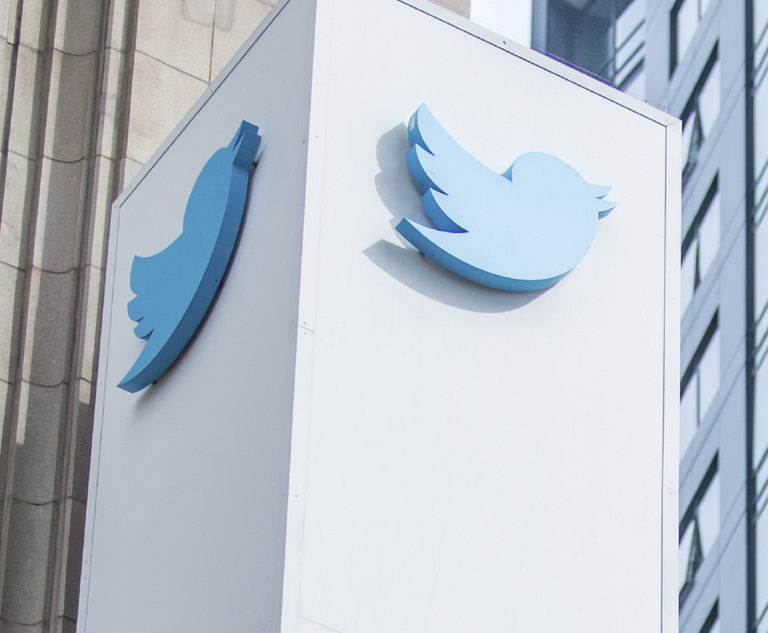'The Court Is Left Scratching Its Head': Judge Quashes Subpoena to Twitter Over Anonymous User
The ruling stops short of the drastic measures the judge mulled during oral argument.
June 22, 2022 at 08:06 PM
3 minute read
 Twitter headquarters in San Francisco. Photo: Jason Doiy/ALM
Twitter headquarters in San Francisco. Photo: Jason Doiy/ALM
A San Francisco federal judge this week quashed a subpoena from a limited-liability company he previously suggested was abusing the judicial process, saying the Twitter user's interest in anonymity outweighs the group's interest in the person's identity.
The 15-page order from U.S. District Judge Vince Chhabria in the Northern District of California stops short of the unusual measures he appeared to be mulling during an oral argument on May 12, when he wondered aloud if he had a duty to push for more information from Bayside LLC about its identity and possible connections to billionaire Brian Sheth, despite its lawyer's statement that he doesn't wish to submit any.
 U.S. District Judge Vince Chhabria of the Northern District of California
U.S. District Judge Vince Chhabria of the Northern District of California Instead, citing Twitter's lack of interest in an evidentiary hearing, Chhabria said, "The record will stand, and the people connected to this mysterious company will succeed in preserving their own anonymity."
Sheth was targeted by the account @CallMeMoneyBags with racy photographs suggesting infidelity, which were then removed after Bayside Advisory LLC obtained copyrights for the photographs and notified the user of infringement.
The LLC wants to sue the person behind the account for copyright infringement, and its lawyers at Glaser Weil Fink Howard Avchen & Shapiro sought an order in U.S. District Court to force Twitter's compliance with its subpoena for identifying information about @CallMeMoneyBags, which Chhabria's order shortened to MoneyBags.
At the same time, Twitter filed a motion to quash the subpoena.
U.S. Magistrate Judge Donna Ryu sided with Bayside, but Twitter's lawyers at Perkins Coie requested de novo review from an Article III judge.
The case was assigned to Chhabria, who pressed Bayside's lawyer Lawrence Hadey, a partner at Glaser Weil, in a 70-minute Zoom hearing about the LLC's possible connection to Sheth, saying he suspected one exists. The judge also said then that the presence of an anonymous speaker moves the case beyond a typical copyright case.
Tuesday's ruling reiterated those positions, with Chhabria writing that Bayside's stated business purpose is "hard to accept at face value, given the suspicious circumstances surrounding" its litigation trying to secure compliance with its subpoena. Chhabria said he had no evidence of Bayside's potential market, and how copyright infringement could harm it.
"And Bayside declined an opportunity (offered at the hearing) to supplement the record with actual evidence of market harm. This factor therefore weighs in favor of fair use," Chhabria wrote, adding, "Even if Bayside had made a prima facie showing of copyright infringement, the subpoena would still need to be quashed because the balance of equities tilts in MoneyBags's favor."
The judge said the court "is left scratching its head."
Bert Kaufman, who is the registered agent for Bayside Advisory LLC, said Chhabria's decision "embraced Twitter's distraction from the core issues and has put at risk the constitutional rights of artists, photographers, sole proprietors, small businesses, and content creators to protect their copyrights and exercise their legal remedies."
"This ruling stands for the dangerous notion that a social media giant can also be judge and jury with impunity; where an anonymous Twitter account that purchased followers and stole copyrighted material is allowed to get away with theft without even showing up," Kaufman said. "Bayside is disappointed and is evaluating its options" for both a lawsuit against the anonymous MoneyBags account and an appeal of Chhabria's order.
This content has been archived. It is available through our partners, LexisNexis® and Bloomberg Law.
To view this content, please continue to their sites.
Not a Lexis Subscriber?
Subscribe Now
Not a Bloomberg Law Subscriber?
Subscribe Now
NOT FOR REPRINT
© 2025 ALM Global, LLC, All Rights Reserved. Request academic re-use from www.copyright.com. All other uses, submit a request to [email protected]. For more information visit Asset & Logo Licensing.
You Might Like
View All

Cybersecurity Breaches, Cyberbullying, and Ways to Help Protect Clients From Both
7 minute read
‘Facebook’s Descent Into Toxic Masculinity’ Prompts Stanford Professor to Drop Meta as Client
6 minute read
Law Firms Mentioned
Trending Stories
Who Got The Work
J. Brugh Lower of Gibbons has entered an appearance for industrial equipment supplier Devco Corporation in a pending trademark infringement lawsuit. The suit, accusing the defendant of selling knock-off Graco products, was filed Dec. 18 in New Jersey District Court by Rivkin Radler on behalf of Graco Inc. and Graco Minnesota. The case, assigned to U.S. District Judge Zahid N. Quraishi, is 3:24-cv-11294, Graco Inc. et al v. Devco Corporation.
Who Got The Work
Rebecca Maller-Stein and Kent A. Yalowitz of Arnold & Porter Kaye Scholer have entered their appearances for Hanaco Venture Capital and its executives, Lior Prosor and David Frankel, in a pending securities lawsuit. The action, filed on Dec. 24 in New York Southern District Court by Zell, Aron & Co. on behalf of Goldeneye Advisors, accuses the defendants of negligently and fraudulently managing the plaintiff's $1 million investment. The case, assigned to U.S. District Judge Vernon S. Broderick, is 1:24-cv-09918, Goldeneye Advisors, LLC v. Hanaco Venture Capital, Ltd. et al.
Who Got The Work
Attorneys from A&O Shearman has stepped in as defense counsel for Toronto-Dominion Bank and other defendants in a pending securities class action. The suit, filed Dec. 11 in New York Southern District Court by Bleichmar Fonti & Auld, accuses the defendants of concealing the bank's 'pervasive' deficiencies in regards to its compliance with the Bank Secrecy Act and the quality of its anti-money laundering controls. The case, assigned to U.S. District Judge Arun Subramanian, is 1:24-cv-09445, Gonzalez v. The Toronto-Dominion Bank et al.
Who Got The Work
Crown Castle International, a Pennsylvania company providing shared communications infrastructure, has turned to Luke D. Wolf of Gordon Rees Scully Mansukhani to fend off a pending breach-of-contract lawsuit. The court action, filed Nov. 25 in Michigan Eastern District Court by Hooper Hathaway PC on behalf of The Town Residences LLC, accuses Crown Castle of failing to transfer approximately $30,000 in utility payments from T-Mobile in breach of a roof-top lease and assignment agreement. The case, assigned to U.S. District Judge Susan K. Declercq, is 2:24-cv-13131, The Town Residences LLC v. T-Mobile US, Inc. et al.
Who Got The Work
Wilfred P. Coronato and Daniel M. Schwartz of McCarter & English have stepped in as defense counsel to Electrolux Home Products Inc. in a pending product liability lawsuit. The court action, filed Nov. 26 in New York Eastern District Court by Poulos Lopiccolo PC and Nagel Rice LLP on behalf of David Stern, alleges that the defendant's refrigerators’ drawers and shelving repeatedly break and fall apart within months after purchase. The case, assigned to U.S. District Judge Joan M. Azrack, is 2:24-cv-08204, Stern v. Electrolux Home Products, Inc.
Featured Firms
Law Offices of Gary Martin Hays & Associates, P.C.
(470) 294-1674
Law Offices of Mark E. Salomone
(857) 444-6468
Smith & Hassler
(713) 739-1250






